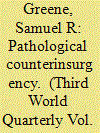| Srl | Item |
| 1 |
ID:
185347


|
|
|
|
|
| Summary/Abstract |
Many conceptualizations of homeland security posit a rigid division between national security, which focuses on global threats and challenges at the systemic level, and homeland or domestic security, which focuses on internal threats and challenges inside a state. Thus, in the United States, Iran is a national security threat, while human trafficking or natural disasters are homeland security threats and challenges. The American conceptualization has come to dominate much of the academic literature and curriculum on homeland security. Analysis of courses in domestic and homeland security in the Middle East shows that an American model of homeland security is a frequent export of American-style education. However, this artificial division is not relevant for small states, even aspiring regional powers, because their security priorities overlap the domestic and international. A case study of the United Arab Emirates demonstrates that its key security priorities are shaped by both domestic and global inputs, and require solutions at both levels. However, many courses on domestic and homeland security in the Emirates do not reflect this reality. In studying and teaching security in non-superpowers, the homeland security concept should be updated to properly fit the strategic context of a small state in theory and practice.
|
|
|
|
|
|
|
|
|
|
|
|
|
|
|
|
| 2 |
ID:
148727


|
|
|
| 3 |
ID:
151512


|
|
|
|
|
| Summary/Abstract |
Many voices in the US policy community have suggested that El Salvador provided a model for US counterinsurgency operations in Iraq and Afghanistan, based on the unsound contention that elections increased government legitimacy and effectiveness. The same flawed assessments were present in counterinsurgency strategy in Iraq and Afghanistan – unfounded assumptions that elections would increase legitimacy and improve institutional performance and human rights records lead to inaccurate analysis and bad strategy. Indeed, the US experience calls into question the ability of even a great power to impose legitimacy on a partner in order to wage counterinsurgency. Assuming that elections will advance such legitimacy is a dangerous pathology.
|
|
|
|
|
|
|
|
|
|
|
|
|
|
|
|
| 4 |
ID:
156933


|
|
|
|
|
| Summary/Abstract |
Literature on security partnerships and alliance formation suggests that such partnerships are based on shared interests and performance rather than ideology. However, in Central America, Nicaragua has made greater contributions to the U.S. security agenda than its ostensible partner Honduras. Nicaragua is often portrayed as an antagonist toward the United States in both the rhetoric of its leaders and that of many elites in the United States, while Honduras self-identifies as a key partner and is portrayed as an important regional supporter of U.S. security priorities. Honduras also receives a much greater share of U.S. regional security funding. However, while Honduras provides some symbolic support for the U.S. in areas such as voting in IGOs, Nicaragua has more reliably advanced U.S. security interests, including action against narcotics trafficking, combating human trafficking, and supporting open economies. U.S. policies that prioritize support for Honduras and treat Nicaragua as an antagonist are based on ideology rather than practice and risk undermining the U.S. domestic security agenda.
|
|
|
|
|
|
|
|
|
|
|
|
|
|
|
|